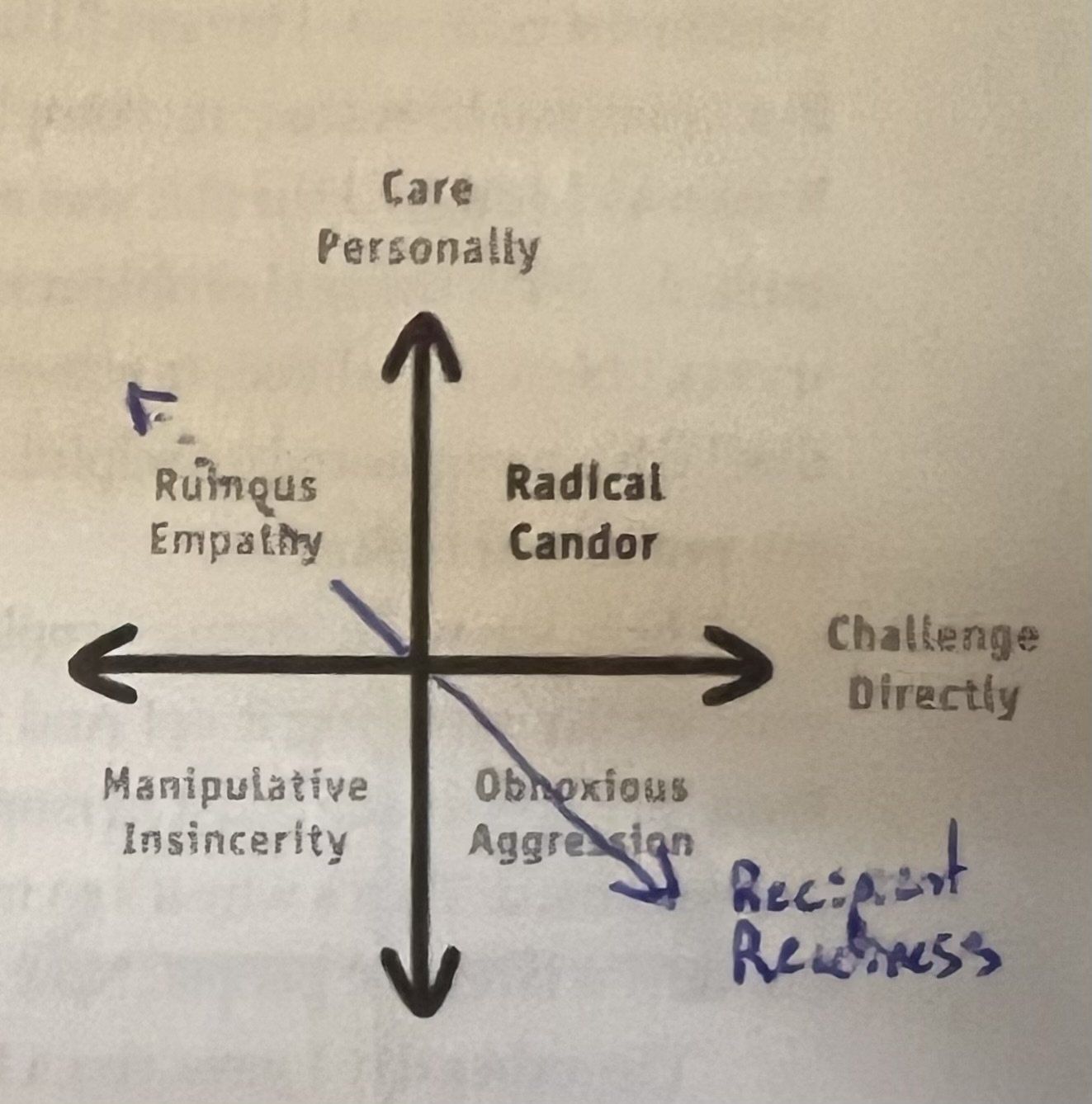Radical Candor:
How to get what you want by saying what you mean
Scott, K.
Radical Candor is a management and communication concept introduced by Kim Scott in her book Radical Candor: Be a Kick-Ass Boss Without Losing Your Humanity.
I first discovered this book in 2018, and could not put it down. Scott was a CEO Coach at Dropbox, Qualtrics, Twitter as well as having been a member of the faculty at Apple University, leader of specialised teams in YouTube and Google, and the author of ‘Radical candor: Be a kick-ass boss without losing your humanity’, and ‘Just work: Get it done, fast & fair’
The ideas that Scott shares with her leaders are deeply insightful and definitely applicable across contexts. Her book is an engaging read, through the sharing of lived experiences (both good and bad), Scott shares how she came to develop the Radical Candor framework, and how the application of this can benefit any organisation and the development of its employees.
Across the book, one of the central elements that is shared is the importance of relationships over power in the achieving of collaborative results.
To be radically candid, a leader must care personally enough to challenge those they are working with directly. It can be seen when someone says, ‘I care enough about you to tell you the real truth here…’ It is a wonderful concept, and clearly demonstrates what can happen if you don’t have both of these factors at play. Without challenge, care becomes ‘ruinous empathy’, without any action points (or difficult concepts) to be engaged with. Without care, challenge becomes ‘obnoxiously aggressive’, and puts people on the defensive rather than creating an environment where they would be willing to entertain, let alone take on board the feedback that you are attempting to provide.
Scott also points out what can happen if the feedback has neither personal care, nor direct challenge, a situation she calls ‘manipulative insincerity’ - where a provider of ‘feedback’ is more concerned about how they would be judged than the outcome or those involved.
To the Radical Candor four quadrants, to which I add an additional axis - that which I call ‘recipient readiness’. I’ve found that in using radical candor that some recipients of feedback are as inexperienced in receiving direct feedback as modern managers are at giving it - and thus some contextualisation around the delivery of feedback can be used to help mitigate the readiness of those you want to benefit from it.
The concept is broken down into four quadrants:
Radical Candor (Care Personally, Challenge Directly): The ideal approach. You care about your team members and give them clear, constructive feedback to help them improve.
Ruinous Empathy (Care Personally, Don’t Challenge Directly): This is when you avoid giving tough feedback to spare someone's feelings, which ultimately harms both the individual and the team.
Obnoxious Aggression (Don’t Care Personally, Challenge Directly): Being blunt or harsh in feedback without showing care for the person. While feedback might be direct, it lacks empathy.
Manipulative Insincerity (Don’t Care Personally, Don’t Challenge Directly): When you neither care for the person nor give them useful feedback. This is the worst behavior, often seen as insincere or manipulative.
The goal is to cultivate a culture where people can be honest with each other in a supportive, empathetic way, ensuring personal growth and a healthy work environment.
In August of 2022 I had the opportunity to talk with Kim Scott about Radical Cador as well as her next book, Just work: Get it done fast & fair, which was published in 2021. The conversation was so enlightening that I divided it into two separate videos - one on disrupting bias in your workplace (link here) and the other on Inoculating your workplace against bias, prejudice, and buillying (link here).
For more information about Kim, her work, or to order her books, please check out her website: https://www.radicalcandor.com/our-approach/.





